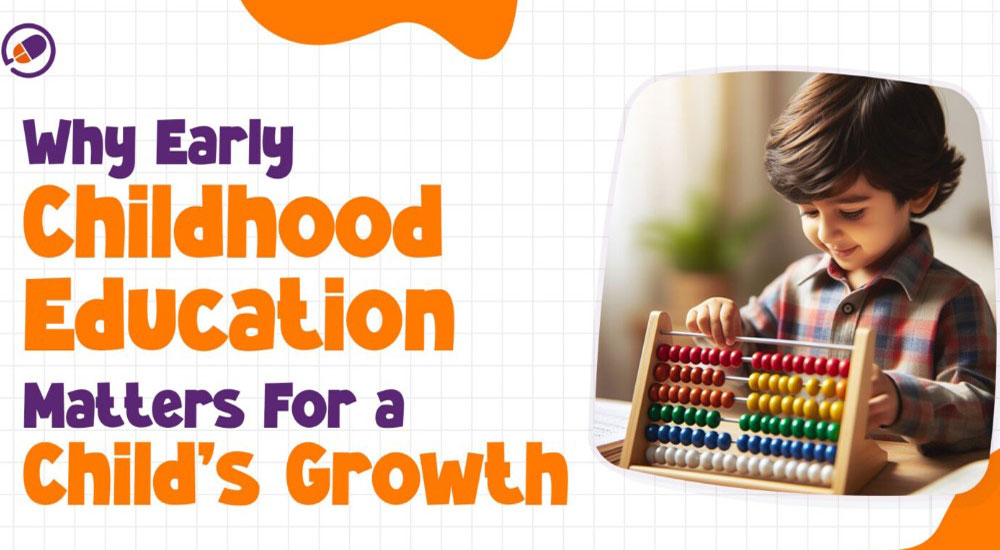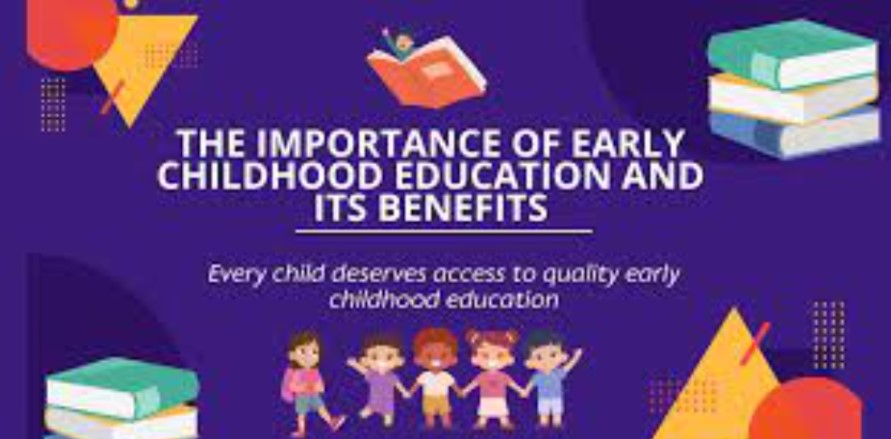Blogs
Why Early Childhood Education is Crucial for Child Growth

Why Early Childhood Education is Crucial for Child Growth
Early Childhood Education (ECE) is commonly regarded as the pillar of a child's development. It gives the child those initial learning experiences that define their physical, social, emotional, and intellectual growth.
The importance of early childhood education in India can never be overemphasised because it sets the stage for lifelong learning and achievement. In this article, we will discuss why early learning and childhood education? are critical to a child's development. Let us understand how early childhood development (ECD) paves the way for the future of every child.
The Significance of Early Childhood Education (ECE)
Early Childhood Education (ECE) generally means formal learning that the children experience from birth to approximately 8 years, an age bracket that spans the most influential periods of their growth. It has been established that the early years are the years when the brain is most receptive, hence the best time for childhood education.?
Preschool education helps a child to develop essential skills upon which they will depend throughout life. This is sometimes called the early childhood development stage, which is characterized by rapid brain development. What happens during early learning significantly affects the child's future capacity to learn, socialize, and flourish in their surroundings.
Let us uncover why early childhood education is crucial for child growth.
1. Cognitive Development
One of the major advantages of early childhood education is its contribution to intellectual development. It is said that children are offered education at a young age. Throughout the initial years, children's brains develop new neural connections in millions, hence making it a perfect time for early learning. According to the National Institute for Early Education Research (NIEER), children involved in exceptional early childhood education programs tend to do much better on literacy, numeracy, and problem-solving.
According to a report by the National Education Association (NEA), children who are given early education tend to do better academically during their entire school careers. Through the development of cognitive abilities, early learning gives children the intellectual capacity they need for academic achievement in future.
Skills developed: Critical Thinking, Strong Memory, and Logical Reasoning
2. Social and Emotional Growth
Early childhood development is also essential in determining a child's social and emotional abilities. The Center on the Developing Child at Harvard University research suggests that high-quality early childhood education enables children to develop important social skills and regulate their emotions. Additionally, research indicates that kids in childhood education programs score better in self-esteem and behavior as they enter high school. A study by 'The Alliance for Early Success' suggests that children who are involved in early learning are better able to deal with stress, recognize their own emotions, and positively interact with others and adults.
Skills developed: Cooperation, Empathy, and Communication
3. Physical Development
Physical development is also an important component of early childhood education. From birth to preschool education, children undergo substantial physical development. World Health Organization (WHO) research points out that early physical activity, such as crawling, climbing, picking objects, and writing, supports the formation of fundamental motor skills. In addition, early childhood development encompasses fostering good habits such as healthy nutrition, which supports long-term physical well-being. Kids who are introduced to active play in early learning environments are likely to carry healthy physical routines into adulthood.
Skills developed: Gross motor skills, Fine motor skills, Spatial Awareness, Coordination, and Balance.
The Long-Term Advantages of Early Childhood Education

The influence of early childhood education reaches beyond the initial growing years, shaping a child's academic, social, and professional life well into adulthood.
1. Academic Success
Research has proven that children who participate in quality early childhood education programs are better students throughout their entire education. Preschool children are more likely to score higher on standardized tests and have higher educational attainment in the future, reports The Organization for Economic Cooperation and Development (OECD).
2. Lessened Achievement Gaps
Research consistently shows early childhood education to be a key factor in narrowing achievement gaps, especially among disadvantaged children. The Brookings Institution conducted a study that discovered low-income children who attend high-quality early learning programs are more likely to excel academically and graduate.
3. Improved Career Prospects
The advantages of early childhood development extend to adulthood, too. The Hechinger Report has reported that kids who attend early education programs are likely to enjoy stable careers, increased earnings, and better career opportunities as adults.
Roles of Parents and Guardians in Early Childhood Education
Parents and caregivers, as much as educators, form an integral part of the early childhood education process. Parental involvement in their child's life has a significant impact on the child's early learning propensities. The National Parent Teacher Association (PTA) reveals that parents' active engagement in their child's early education significantly improves their social and academic performance in the schooling environment.
How parents' participation helps in early childhood development?.
- Enhance a child's academic and social achievement.
- Establish good habits and emotional control.
- Facilitates cognitive growth and emotional well-being.
- Promote curiosity through questioning, investigating new concepts, and exploration.
- Teach effective open communication.
- Instill self-confidence, self-worth, and emotional security.
- Encourage social skills through model sharing, turn-taking, and empathy.
- Establish practical learning goals and expectations.
Conclusion
The importance of Early Childhood Education (ECE) cannot be overstated; it is perhaps the most critical part of a child's growth and development. It enhances mental, emotional, social, and physical development all at the same time, and lays the groundwork for lifelong learning, health, and achievement. As research suggests, early childhood development programs are necessary for student success, closing achievement gaps, and enhancing career preparation in children.
As studies continue to validate the significance of early childhood education, it is essential that families, governments, and communities make the early years a period of critical learning and development. In doing so, we not only provide children with a solid foundation for the future but also help create a more educated, compassionate, and prosperous society.
Frequently Asked Questions
1. What is Early Childhood Education (ECE)?
Early Childhood Education (ECE) is formal and informal education that children undergo from birth to approximately 8 years of age. It emphasizes early learning experiences that support cognitive, social, emotional, and physical development.
2. Why is Early Childhood Education significant to a child's development?
Early Childhood Education is significant as it forms the basis for a child's cognitive, social, and emotional development. In the early years, a child's brain is highly malleable, and effective ECE programs stimulate brain development, enhance language and problem-solving abilities, and enable children to form healthy social relationships.
3. How does Early Childhood Education affect a child's future success?
Children who participate in good quality childhood education programs perform well academically, graduate in greater numbers, and are likely to have high-quality careers. ECE eliminates achievement gaps, especially for low-income children, and improves long-term outcomes such as higher earnings, stable work, and improved health.
Categories
| Importance of childhood education |
Latest Blogs
| How Concept-Based Learning Is Replacing Rote Memorization in Schools |
| Step-by-Step Process for Securing Admission in Jaypee Noida |
| How Students Can Help Reduce Plastic Waste at Home and School |
| 5 Innovative School Practices Supporting Sustainability and SDG Alignment |
| How Schools Can Create Future-Ready Citizens Through a Holistic Curriculum |
| Top 10 Questions to Ask During a Daycare Visit |
| The Psychological Benefits of Extracurricular Activities on Student Mental Health |
| The Role of School Culture in Academic and Social Development |
| National Education Policy: How it Is Changing School Performance in India |
| How Do Indian Schools Compare With Global Education Standards? |
